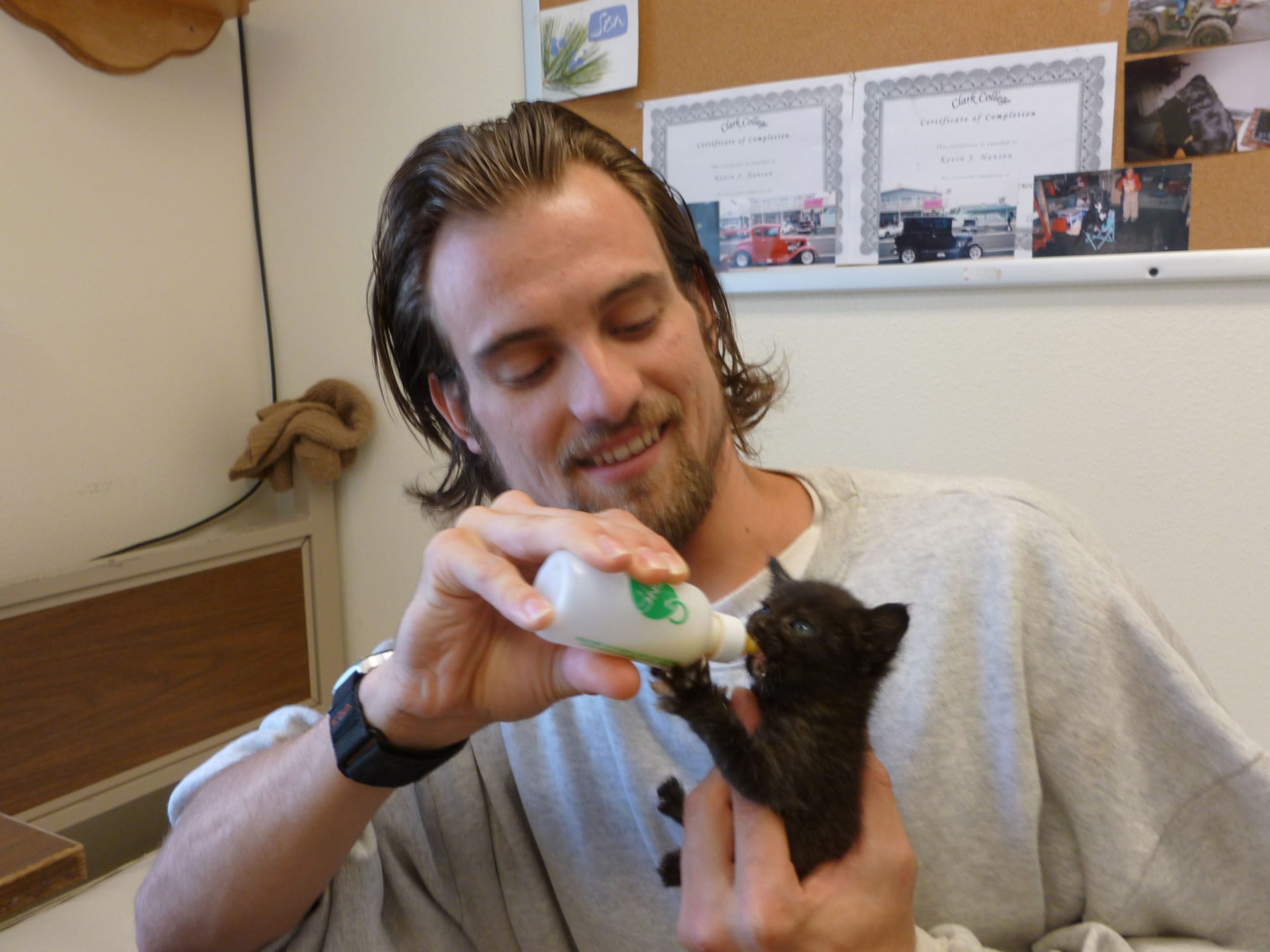Anyone interested in adopting one of these cats or kittens should visit the Cuddly Catz website and fill out an adoption application.
YACOLT — When Larch Corrections Center inmate Richard Amaro went to prison in 2008, he left behind four kids. But the 36-year-old recently took in a couple of 4-week old kittens and feels like a dad all over again.
He bottle feeds them every three hours, plays with them, cleans up after them and lives with them 24/7.
“It’s just like when you have a newborn baby. They’re always crying,” Amaro said.
Six kittens rescued from an animal abuse case in Kittitas County were paired with convicts at the corrections center in Yacolt on Monday. These kittens are new to the prison’s cat foster program, which started earlier this year.
Amaro and Jerry Warfield share their 12-foot by 10-foot cell with the two kittens and a cat named Owen, who is one of three adult cats at the facility. They take care of the cats in shifts.
Shelves line the walls, so Owen can perch on them. Like the other cats at the facility, Owen has behavioral issues. He hisses at the kittens when they get near, but the inmates say Owen is a lot less shy than he used to be.
Amaro has been at the facility about four years after being convicted of theft, harassment and contracting without a license. Joining the cat foster program changed how he views prison life and how he views himself, he said.
“It’s not about myself anymore,” he said.
Inmates have to apply for the program, which includes an interview and writing an essay. They can’t have any violent crimes toward humans or animals on their record, they must be free of major infractions for at least six months, and need to be at the prison for at least 12 months after the time they receive the cat.
Being in the cat program helps time past faster for Amaro, who is set to be released in May 2013. Before working in the cat program, he worked outside with the Department of Natural Resources cutting trees and fighting forest fires.
The inmates earn 35 cents per hour for taking care of the felines and can earn no more than $55 per month. It’s the lowest paid position at the facility-and the only one without time off, but those in the program say they wouldn’t have it any other way.
“I’ve had my share of jobs here, and this is the one for me,” Warfield said. The 40-year-old grew up on a farm and wants to work with animals once he gets out of prison.
Having to give constant care to the kittens makes the time past faster, the inmates said. Having cats to come home to gives them a sense of responsibility and purpose.
“The direction of my time was going nowhere,” said Bobian Webster. Before the foster program, he worked in the kitchen.
Webster said he feels good about giving back to the community and getting to care for something. In prison, the cats get 24-hour attention. In a shelter, he said, they might not get the same kind of treatment.
“Once you get into something like this, you have something to write home about,” he said. “My kids are excited. They feel a lot better about me being here.”
Webster takes care of Nakima and Kola with his cellmate Kevin Hansen. He wanted to name one of his children Nakima, but his wife wouldn’t let him. He said being with the cats has made his time behind bars more enjoyable. He’s not distracted by the everyday drama at prison, he said, and he’s seen a change in himself.
“My personality has changed,” he said. “Your thoughts are constantly on something that’s good.”
Selena Davis, spokeswoman for Larch Corrections Center, said the cat program improves inmate behavior.
“It not only keeps them busy, it increases safety,” she said. “They just love them.”
Handling the cats has helped calm them down and improve their behavioral issues. It’s also calmed down the prisoners.
“It’s more peaceful,” said inmate Brian Bacon, 21. “You have an outlet. You have something to show affection to that shows it back.”
The inmates help develop brochures for the Cuddly Catz program and write weekly reports about how the cats are faring. At frequent handler meetings, they talk about everything from teeth to fur to disposition.
“The outcome we want is for the cats to be adoptable,” Webster said.
The program relies on donations. Claus Paws Animal Hospital provides veterinary care, the Royal Meow donates cat perches, and Orchard Feed supplies the cat food.
When the kittens are ready to be adopted, Cuddly Catz will list them on its website.
Patty Hastings: 360-735-4513; http://www.twitter.com/col_cops; patty.hastings@columbian.com.




